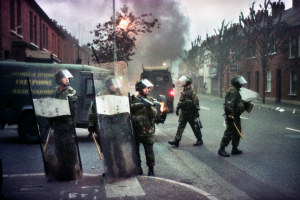Build the Truce – inspired by the Olympic Games, opens at IWMN
19 Jul 2012
A film launched tomorrow (20 July) and co-curated by a University of Manchester lecturer and shown at IWM North, part of Imperial War Museums, is to argue that winning the peace is just as important as winning the war.

Dr Tim Jacoby, who is a senior lecturer in conflict studies, says more people should be aware that the violence did not stop after the signing of ceasefire agreements in Iraq, Northern Ireland, Sierra Leone, El Salvador and Kosovo.
Dating back to the 9th century BC, an Olympic Games ‘Truce’ was created to enable athletes from Greece’s warring cities to travel and compete in safety. Reinstated at the 1992 Olympic Games, the truce continues to exist during Olympic and Paralympic Games today.
Drawing on this theme, IWM (Imperial War Museums) launched the innovative learning initiative Build the Truce, which works with eyewitnesses and educational and family groups across the country to investigate the concepts of truce, conflict and resolution and their relevance in the 21st century.
This summer, at IWM North (from 20 July) and IWM London, new Build the Truce displays, will show the interviews and insights collected throughout this project.
IWM North will present Build the Truce: the Big Picture Show – an immersive, 360 degree display of interview excerpts and footage. As the lights go down, footage and images are projected onto 27 ft high walls all around the Main Exhibition Space, powerfully taking visitors into the heart of the action.
Visitors will encounter a compelling soundtrack of eyewitness interview material, set against footage drawn from the locations and stories themselves. These stories highlight the notion of truce, and the efforts of individuals to broker or to break permanent peace.
Highlights include extracts from interviews with a broad range of contributors such as Seanna Walsh, a former IRA prisoner, and Jackie McDonald, a former UDA prisoner, both now involved in community peace-building in Northern Ireland; Courtny Edwards, who worked with a health charity in amputee camps following civil war in Sierra Leone; and Professor Tony Redmond OBE, who led medical aid teams in Kosovo following NATO attacks in 1999.
Touchscreens will allow visitors to engage with additional interview material, and to find out more about these conflicts and how they were eventually resolved.
Seb Coe, Chair of the London Organising Committee of the Olympic Games and Paralympic Games said: ‘The Inspire programme is ensuring the legacy of the 2012 Games starts now as projects like Build the Truce use the power of the Games to inspire change.’
Dr Jacoby is Senior Lecturer at the Institute for Development Policy and Management and co-founder of the Humanitarian and Conflict Response Institute at The University of Manchester and has many years experience living and working in conflict-affected countries.
He said: “Conflicts in many places have - at a superficial level - been ended over recent years.
“But the problem is, the underlying problems which caused the war in the first place are not resolved- and that often means violence can continue.
“Demobilisation efforts are often impaired by the fact that there are no jobs and no prospect of addressing the needs of a traumatised public.
“As a result, crime and violence are still able to flourish - sometimes at levels comparable to the recently ended conflict.
He added: “Through the film, we challenge the prevailing view that bringing an end to war represents a resolution of the cause of war.
“It is inspired by people living and working in the aftermath of conflict based on interviews with civilians, ex-combatants and aid workers.”
“They witnessed conflict and truce in Iraq, Northern Ireland, Sierra Leone, El Salvador and Kosovo and share their perspectives on how we move away from, or towards, peace.”
